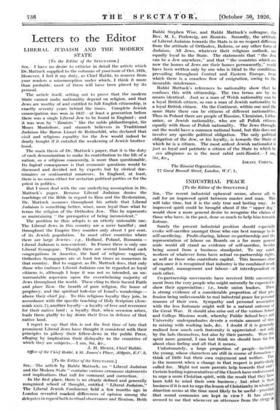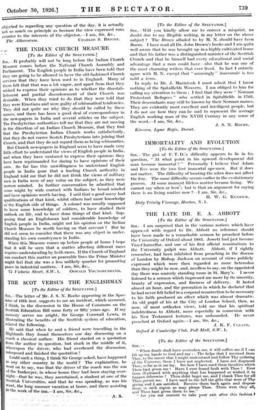INDUSTRIAL PEACE
[To the Editor of the SPECTATOR.] SIR,—The recent industrial upheaval seems, above all, I call for an improved spirit between master and man. This will take tithe, but it is the only true and lasting way. An improved spirit could be brought about if the " upper dog would show a more general desire to recognize the claims of those who have, in the past, done so much to help him towards fortune.
Surely the present industrial position should especially evoke self-sacrifice amongst those who can best manage to be self-sacrificing. Profit-sharing, labour co-partnership and the
representation of labour on Boards on a far more general scale would all stand as evidence of self-sacrifice, besides
being sound from a business standpoint. To my mind, workers of whatever form have actual co-partnership rights, as well as those who contribute capital. This becomes clear when once it is recognized that industry is the combined result of capital, management and labour—all interdependent on each other.
Co-partnership movements have received little encouras,,e- ment from the very people who might naturally be expected to show their appreciation ; i.e., trade union leaders. Them is strong evidence of a considerable proportion of that pro- fession being unfavourable to real industrial peace for personal reasons of their own. Sympathy and personal association with the less fortunate might well be a natural outcome of the Great War. It should also arise out of the various School and College Missions work, whereby Public School boys and University undergraduates devote a certain amount of time to mixing with working lads, &c. I doubt if it is generally realized how much such fraternity is appreciated—not only by the lads themselves, but also by their parents. Were this spirit more general, I. can but think we should hear far lest about class feeling and all that it means.. Unfortunately, a large proportion of • people—including the young, whose characters-are still in course of formation— think of little but their own enjoyment and welfare. This is the moment when a change in that respect is particularlY, called for. Might not more parents • help towards that end . Certain leading representatives of the Church have endeavoured to urge a more Christian spirit, with the result that they have been told to mind their own business ; but what is their business if it is not to urge the lesson of Christianity in.whater _ter direction seems at the time most likely to be useful—prollicu that sound economics are kept in view ? It has alisaYS seemed to me that whenever an utterance from the clergy"
objected to regarding any question of the day, it is actually not so much on principle as because the view expressed runs counter to the interests of the objector.—I am, Sir, &c.,



























































 Previous page
Previous page